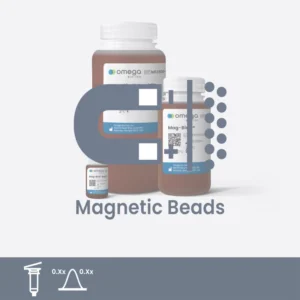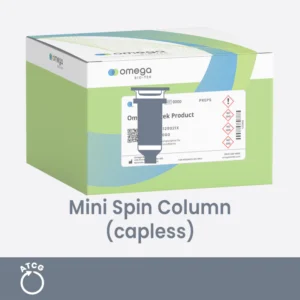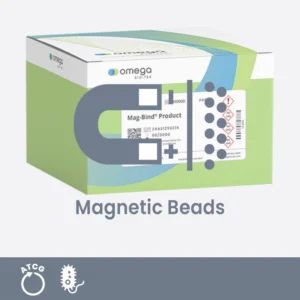Introduction
Traditionally, plasmid DNA purification hinges on alkaline lysis. In this method, bacteria, typically E. coli, containing the targeted plasmid DNA are harvested from overnight culture and resuspended in solution. A highly alkaline solution containing a detergent lyses the bacteria cells and denatures both the plasmid and genomic DNA. The addition of a highly acidic neutralization buffer allows the nitrogenous bases of the plasmid DNA to rapidly reform hydrogen bonds due to the plasmids’ small number of base pairs. The genomic DNA of the E. coli is much larger, and therefore takes longer to completely re-bond. Potassium introduced from the neutralization buffer will bring the genomic DNA, along with proteins and other cellular debris, out of solution, and RNase A will attempt to remove RNA from the solution. Subsequent steps of alkaline lysis will precipitate plasmid DNA and wash away remaining salts and RNase A.
With the rising popularity of magnetic bead-based nucleic acid extraction, many companies, including Omega Bio-tek, have developed magnetic bead-based plasmid purification kits based on solid-phase plasmid DNA purification methods which allow for lysate clearance using magnetic beads. Still, plasmid eluates from these kits are often still contaminated with bacterial RNA which can hinder downstream applications. This presents a need for an effective and efficient method of removing stubborn bacterial RNA from extracted plasmids.
A group of researchers have produced a proof-of-concept paper that tested the use of Omega Bio-tek’s Mag-Bind® TotalPure NGS, for depleting bacterial RNA in plasmid DNA extractions1. Size selection magnetic beads are coated in anionic carboxyl molecules and suspended in a solution of polyethylene glycol (PEG) and salt (Na+). Saturating DNA with PEG and salt causes the DNA to clump into large coils, aggregate, and precipitate out by binding to the carboxylated beads. Plasmid DNA is eluted by using an appropriate ratio of magnetic beads to DNA, following the logic that larger molecules like plasmids will be eluted, while smaller molecules like bacterial RNA will not bind to the beads and stay in the initial buffer.
Methods
Plasmid DNA was isolated using the alkaline lysis method of purification and two commercial plasma DNA miniprep purification kits. Isolated plasmid DNA was examined using agarose gel and ethidium bromide staining for qualitative and quantitative analysis. Following this, bacterial RNA was removed using both an RNase A digestion method and the size-selection magnetic bead method using a volume ratio of 5:2, Mag-Bind® magnetic bead volume to plasmid DNA volume. To test the efficacy of the plasmid DNA for downstream applications, HEK-293 cells were transfected with plasmids and examined under bright field and fluorescent microscope.
Results and Discussion
Traditional methods of bacterial RNA depletion from plasmid DNA utilize RNase A. RNase A depletion was tested on plasmids isolated using alkaline lysis by digesting approximately 1 µg of plasmid DNA with RNase A for 0, 30, 60, and 90 minutes before analyzing on agarose gel. Bacterial RNA was still readily detectable after 90 minutes of RNase A digestion, illustrating the difficulty in removing contaminating RNA through traditional methods. Significant amounts of bacterial RNA were also present in the plasmids isolated using the two commercially available extraction kits, even though RNase A is utilized in these extraction kits.
The effects of contaminating RNA on the efficacy of downstream transfection were tested using HEK-293 cells and plasmid DNA containing various amounts of total RNA. It was found that transfection efficiency drastically decreased in the groups containing higher amounts of contaminating RNA, emphasizing the need for an effective method of RNA removal.
Size selection magnetic beads have been utilized extensively in NGS library preparation, though they are often only available as part of a larger NGS kit, making them more expensive. However, Mag-Bind® TotalPure NGS beads are available commercially in bulk as a standalone component at a much lower price than a complete NGS kit. A size selection magnetic bead protocol was optimized for the removal of contaminating bacterial RNA based on the difference in size between the RNA and plasmid DNA. Compared to the plasmids isolated using only alkaline lysis, plasmids that were subsequently subjected to the Mag-Bind® TotalPure NGS RNA removal protocol contained undetectable amounts of RNA. Analyzing the discarded supernatants showed the presence of the bacterial RNA that had been removed. The integrity of the plasmids treated with RNase A versus Mag-Bind® TotalPure NGS was evaluated using direct transformation of the plasmids into cells. From this, it was found that the plasmids subjected to the Mag-Bind® TotalPure NGS protocol produced the highest number of colonies compared to the plasmids treated with RNase A, which produced less colonies than untreated plasmids.
Conclusion
There is a great need in molecular and cellular biology for a plasmid purification method that is affordable, efficient, and reproducible. Traditional methods of plasmid purification, as well as commercial purification kits, are unable to completely remove contaminating bacterial RNA, limiting the plasmids’ efficacy downstream. Here, an RNA removal protocol utilizing Mag-Bind® TotalPure NGS magnetic size selection beads was shown to be effective, inexpensive, and user-friendly, making it a superior plasmid cleanup method to RNase A digestion.
References
[1] Wang, X., et al. Development of a simplified and inexpensive RNA depletion method for plasmid DNA purification using size selection magnetic beads (SSMBs). Genes & Diseases 2021, 8(3), 298-306. DOI: 10.1016/j.gendis.2020.04.013
WP-0048
Related Products
-
Cleanup
Mag-Bind® TotalPure NGS
$0.00 – $4,481.70Price range: $0.00 through $4,481.70 Select options This product has multiple variants. The options may be chosen on the product page -
Bacterial Plasmid
E.Z.N.A.® Plasmid DNA Mini Kit I, (Q – spin)
$0.00 – $550.30Price range: $0.00 through $550.30 Select options This product has multiple variants. The options may be chosen on the product page -
Bacterial Plasmid
Mag-Bind® Ultra-Pure Plasmid DNA 96 Kit
$0.00 – $404.20Price range: $0.00 through $404.20 Select options This product has multiple variants. The options may be chosen on the product page



